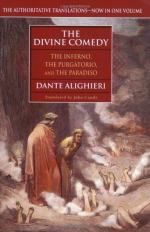|
|
The Inferno Topic Tracking: Human Reason
Canto I
Human Reason 1: Virgil is commonly accepted to represent Human Reason. He was a venerable poet but born before Christ and therefore unsaved. He is Dante's guide through the Inferno and Purgatory but not Paradise.
Canto VII
Human Reason 2: Virgil and Dante discuss the goddess Fortune as they traverse the fourth ring of Hell. Virgil explains that the goddess rules man's destiny according to God's will. She is insensible of human reason and emotion and therefore human attempts to alter or understand individual destinies are futile.
Canto VIII
Human Reason 3: Dante, asking Virgil to explain the signal flames they see on the walls of the City of Dis, refers to him as the "Sea of all intelligence."
Canto IX
Human Reason 4: Virgil fails to get past the fallen angels, who deny he and Dante entrance to the City of Dis, without the help of an angel sent from Heaven. This is the first instance during their journey through Hell in which his powers are demonstrated to be ineffective.
Canto X
Human Reason 5: The sixth circle is occupied by heretics. Dante meets several Epicurean heretics, who believed that the highest form of happiness was not closeness to God but the absence of pain. These sinners substituted philosophy for God.
Canto XI
Human Reason 6: The second circle nests hypocrisy, flattery, sorcerers, cheating, theft, simony, and pandering. Dante questions why the carnal, gluttonous, avaricious, prodigal, wrathful, and gloomy are not punished here, and Virgil explains that these sins less offend God than violence and malice because they are an indulgence of what is naturally enjoyable. The man who does natural things in excess is more Godly than he who acts in an unnatural way. Hell is designed according to God's will, but Virgil explains using examples from philosophy and ethics.
Canto XIII
Human Reason 7: The soul of Pier delle Vigne explains to Dante and Virgil that at the second judgment of all souls, which occurs at the end of time, those who have committed the isn of suicide will regain their bodies but not to wear because it is not just that a man have what he takes from himself.
Canto XX
Human Reason 8: Dante pities the souls of the diviners in the fourth ring of the eighth circle, but Virgil rebukes him saying it is impious to pity those who God condemns. Their sins are deserved and their punishments perfect.
Canto XXIII
Human Reason 9: After leaving a demon escort in the fifth ring of the eighth circle, Dante intuitively fears that the demons will chase them and perhaps do them harm. He shares his fears with Virgil who agrees to hasten to the next chasm. The demons appear in pursuit a moment after.
Canto XXIII
Human Reason 10: Virgil finds the location of the collapsed bridge and realizes that the demons of the fifth ring of the eighth circle lied when giving them directions. This is the second point in the poets' journey through Hell at which Virgil's powers have been foiled.
Canto XXVII
Human Reason 11: Count Guido da Montefeltro agrees to give the Pope sinful advice after securing his forgiveness in advance. This logic does not get him out of Hell.




